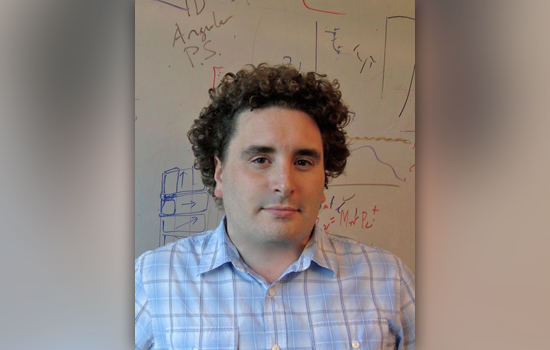Center for Detectors adds astrophysicist
Astrophysicist Michael Zemcov measures cosmos, studies early universe
Michael Zemcov
Rochester Institute of Technology has hired scientist Michael Zemcov as an assistant professor in the Center for Detectors and the School of Physics and Astronomy.
Zemcov will join RIT this fall from the California Institute of Technology, where he held a senior postdoctoral fellowship and served as an affiliate scientist at NASA’s Jet Propulsion Laboratory. He is an astrophysicist with specialization in the measurement of the cosmic microwave and infrared background radiation.
A major focus of Zemcov’s research is intensity mapping measurement of cosmological structure formation and studies of the epoch of reionization that ended the opaque “Dark Age” of the early universe. This is when scattering electrons and protons began to form neutral hydrogen atoms and the cosmos grew increasingly transparent.
In addition to astronomical observation, Zemcov also develops enabling technologies for astrophysics and leads team projects on platforms ranging from ground-based to sub-orbital and space observatories. He is a co-investigator and the lead instrument scientist of the recently selected NASA Explorers Program, Spectro-Photometer for the Extragalactic structure, Reionization and Ices eXplorer (SPHEREx) awarded to the California Institute of Technology. SPHEREx will conduct an all-sky near infrared survey that will probe the origin of the universe, search for ice on planets that could harbor life outside our solar system, and explore the evolution of galaxies.
“By accessing large spatial scale information, SPHEREx is capable of extracting a huge amount of information about even the most faint and distant galaxies in the universe,” Zemcov said. “This project promises to revolutionize our understanding of the physics of the cosmos. I am thrilled to bring involvement in this and other projects to RIT, where the Center for Detectors will allow me to purse a world-class astrophysical research program at a leading institution.”
Zemcov’s expertise will expand the Center for Detectors’ ability to develop and conduct experimental science on advanced astronomical instrumentation in new application areas.
“Professor Zemcov’s research leads the world in important applications for technology developed in the Center for Detectors,” said Don Figer, center director and professor in RIT’s astronomical sciences and technology department. “We look forward to increasing opportunities and collaborations that his research brings to RIT and the center.”
RIT’s Center for Detectors is a multidisciplinary group of laboratories that advances sensor technologies for astrophysics, biomedical imaging, Earth system science and interplanetary travel.














